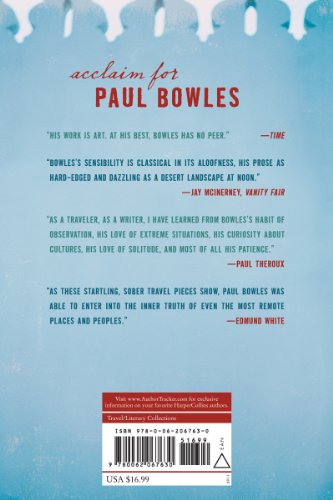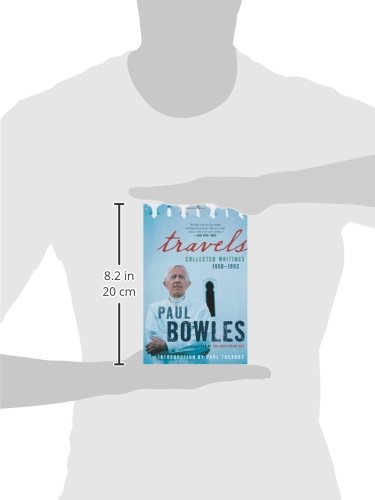



Full description not available
P**Y
Paul Bowles Traveller
I can say that Paul Bowles is one of my favorite writers and now having read Travels: Collected Writings 1950-1993 (2010), I have finished reading all of his available writings. This collection is mostly made up of pieces that were, collected earlier in, Their Heads Are Green and Their Hands Are Blue (1963). I think if there were that many pieces in a collection by another writer I might have not bothered with the collection or skipped those pieces. But I decided to re-read them and savor the familiarity and evocative scenes described Bowles who has a gift of bringing the atmosphere of a place to life, for example the Sahara Desert in "Baptism of Solitude," as well as the people that populate those specific places, like in "Mustapha and his Friends." There are two excellent pieces about his travels into countryside and mountains of Morocco to record the traditional music there that is some of his best writing in "The Route to Tassemit" and "The Rif, to Music." In those pieces, in particular, he brings Morocco and the inhabitants to life. But he awakened an interest for me in his in his part-time home in Ceylon, that is the subject of "Fishtraps and Private Business." I plan to make a pilgrimage to his private island on my visit there next month. The book is arranged chronologically by editor Mark Ellingham and contains mostly travel pieces but also travel-oriented journals, introductions to photographic books, and even a glossary of kif terms for a 1960s books on cannabis. It includes an introduction by one of my favorite travel writers Paul Theroux as well. I suspect some of the material may have been cannibalized for Bowles' autobiography, Without Stopping, which I also recently read. The earliest pieces are from Bowles early days as a teenager in France-among the 30 uncollected writings spread throughout the book. There were a number of pieces from the now defunct Holiday magazine that were among my favorites as well: "How to Live on a Part-Time Island" (another piece that inspired me to visit Ceylon), "Madeira" (on the isolat4ed Portuguese island), "Window on the Past" (about Spain), as well as several pieces on Morocco and cities in Morocco. I was impressed with pieces about travel in Istanbul ("A Man Must Not Be Very Moslem"), India ("Notes Mailed at Nagercoil), the Mau Mau uprising in Kenya ("Letter from Kenya") as well as a piece about the civil war in neighboring Algeria ("Sad for U.S., Sad for Algeria"). I think the following quote from "Windows on the Past" sums up Bowles' perspective on travel writing: If I am faced with the decision of choosing between visiting a circus and a cathedral, a cafe and a public monument, or a fiesta and a museum, I'm afraid I shall normally take the circus, the cafe, and the fiesta, trusting to luck that I shall manage to see the other s later. I supposed I'm not what today is called culture-minded. Perhaps the that is because the culture of a land at any given moment is the people who live in it and the lives they lead in it, not the possessions they have inherited from those who came before. They may or may not profit by their legacy. If they do, so much the better for them; but whether they do or do not, their culture is represented by them and not by their history.I feel a sort of kinship with Bowles and hope to see as much as he has seen. I can't help but note that he did it so much earlier than others and had to struggle and suffer in order to do so. Bowles was not a fan of progress and I suspect most travel today would have been too tame for his type of adventure lust-very much a trailblazer and original thinker.
L**D
Brilliant, Insightful Writing
When we think of Paul Bowles, we often think of a quirky man living an unconventional bohemian lifestyle in Tangier - someone who embodies the very word, "decadent". These travel essays show us another side of Bowles - that of a sensitive and highly observant master of the essay. The prose style of the writings are nothing short of brilliant. Bowles is clear, detailed, organized, poetic and entertaining. Of particular interest to me is Bowles roundabout take on neo-colonialism and the Third World after World War Two. Bowles' clear sympathies lie with the underdog and the downtrodden - like the Berbers of North Africa or the nomads in the Sahara, and show Bowles to be light years ahead of the developments of today's Arab Spring. In addition, Bowles take on the new and old colonizers: the French, the Spanish, the British, and the newly arrived Americans - runs from amused to slyly skeptical and at times, openly horrified by the bad behavior of these countries. Even the city Arabs of Morocco as opposed to the mountain Berbers do not evade Bowles' sharp eye. Note that Bowles writes of a period of profound transition (the 50s to the 70s) in North Africa. During this period of time, the U.S. went from World War Two hero and savior to co-conspirator and neo-colonizer. Why? Why, for example, were the French using an American Air Base in the early 60s in Morocco to conduct bombing missions over Algeria? This was at a time the U.S. was supposedly neutral with regard to the conflict in Algeria. In fact, I remember as a child in Kenitra, the U.S. Navy denying the existence of the bombing missions, but on a daily basis, I could see the French bombers take off from the U.S./French airbase from my nearby house. Did the U.S. help to destroy a fledgling democracy when we should have been supporting it? And where has our approach gotten us today? Are we still feeling the results of our ill advised policies? Today's diplomats and historians would do well to revisit this era in North Africa and explore why American Foreign policy appeared to have lost its bearings and jumped the rails. To begin this reexamination, I would highly recommend reading "Travels: Collected Writings" as a highly illuminating start.
D**R
A visual journey through words
"Travels," the collected writings of Paul Bowles' is my first exposure to his writing. I purchased this book as a result of reading Jeff Greenwald's "The Size of the World," where Greenwald is received by Bowles in his home in Tangier and, in their ensuing dialogue, began to take measure of the man. I found it fascinating that Bowles chose to live within a culture where the seeking of solitude is considered an aberrant behavior, a behavior Bowles strongly insisted upon but never verbalized until Greenwald put the reason into print: Bowles has never been able to sleep in the same room with another person..."it's something I could never do, never in my whole life." My objective, when reading a book on travel, is to experience the land, the people, the culture in its fullest dimension through the lens of someone from my own culture. To that end, Bowles delivers. His philosophy on what makes a travel book "is the story of what happened to one person in a particular place" and where "the personality of the author is the decisive element." His accounts are at once poetic, politically astute, and incorporates the dialogue and cultural habits of the inhabitants while directing the reader to conclusions that conform to his informative opinion. While some readers argue that the repetitiveness of this book of collective writings is its downfall, I found the repetitiveness helpful in that it replayed the images of earlier chapters, images I hope to see for myself since Morocco is on my bucket list.
A**R
Superb Travel Writing
This might be the best book of travel writing that I've read -- engrossing!
A**N
Paul Bowles' Travel Writings: Fantastic
This is a wonderful collection of the travel writings of American author and composer Paul Bowles. Written over many years in an era when magazines and the authors they published were still literary, these pieces provide a fascinating look at people, places and times gone by. Like the photos of Cartier-Bresson or Garry Winogrand, Bowles' writing captivates and stimulates the reader. One reading isn't enough. Bowles' pieces give insight into cultures both foreign and domestic; into times both present and past.
J**Y
Interesting Collection of the essays of Paul Bowles
Collection of travel essays that were originally published in 1950s/60's magazines. A nice collection.Now waiting for Part 2 (hopefully.)
Trustpilot
1 day ago
1 month ago